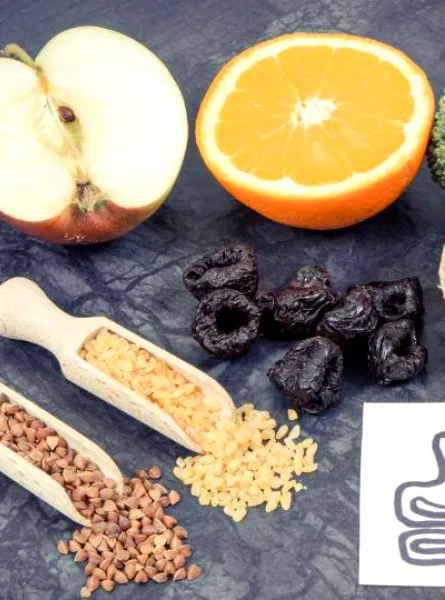
The idea of paying attention to our carbohydrate intake is not entirely wrong, since some carbohydrates can have positive effects on our health whilst others can not. Carbohydrates have a much more complex role in our diet than we think, especially for those with irritable bowel and those with bloating or gas symptoms. The FODMAP diet is one of the diets that helps manage this problem.
Irritating carbohydrates
Carbohydrates are essential to our survival, providing energy to ensure growth and proper functioning of the body. Normally, our body digests and absorbs them without any problem. However, it appears that some individuals with a slower digestive system are not able to digest certain types of carbohydrates in greater quantity (see Appendix 1) that are part of the FODMAP group: these are fermentable carbohydrates [1]. In these people, these components can cause gas and stomach pain [5].
* Fermentable Carbohydrates: fructan, galacto-oligosaccharide, lactose, fructose (a higher ratio of fructose to glucose), sorbitol, mannitol, xylitol, and maltitol
The FODMAP scheme
The FODMAP diet aims to create a diet low in fermentable carbohydrates that would be suitable for everyone, to minimize gastric and intestinal symptoms [2-7]. This is a 4-8 week program with three phases (elimination, reintroduction and customization).
The program begins with an elimination of irritating foods, including fermentable carbohydrates. These foods are subsequently reintroduced in a systematic and controlled manner in the diet. Finally, our nutritionists personalize the plan based on observations and results in terms of symptoms. These steps should be done under the supervision of a nutritionist or a physician to avoid any complications and to reap the benefits.
Today's discoveries
The FODMAP diet can also reduce the symptoms of diarrhea and stomach pain experienced by people with irritable bowel syndrome. In principle, however, it is a short-term food program and not a permanent solution. The permanent solution must include a reintroduction of these foods. Research continues to better understand the effect of the FODMAP regimen over a prolonged period (beyond 8 weeks), on the gut microbiota, and on the acquisition of all essential nutrients [2-6]. In conclusion, the FODMAP diet can offer relief for people with irritable bowel syndrome.
If you would like to know more, do not hesitate to contact us for more information on our method for irritable bowel syndrome or to make an appointment with our nutritionists!
Appendix 1 - High Fermentable Carbohydrate Foods
Vegetables
- Garlic
- Artichokes
- Asparagus
- Beet
- Chinese broccoli
- Celery
- Mushrooms (except canned and oyster mushrooms)
- Savoy cabbage
- Cauliflower
- Sauerkraut
- Legumes
- Sweet corn
- Bitter melon
- Onions (all)
- Yam
- Snow peas
Fruits
- Avocat
- Ripe banana
- Cherry
- Dried fruits
- Grenade
- Mango
- Nashi (Chinese pear)
- Nectarines
- Grapefruit
- Peaches
- Pears
- Apples
- Prunes
- Plums
Dairy products and substitutes
- Buttermilk
- Cream
- Ice cream
- Cheese (soft)
- Kefir
- Soy milk
- Cow milk
- Yogurt
Meat and substitutes (proteins)
- Falafel
- Legumes
- Soy Protein (PST)
- Almonds (> 10 nuts)
- Cashews
- Pistachios
- Cereals products
- Flour (coconut, wheat, spelled, rye)
- Pasta (wheat, spelled)
- Bread (wheat, spelled, rye)
Resources
[1] https: //www.soscuisine.com/menus/fodmap-intestin-irritable/alimentation -...
[2] Altobelli, E. N. (2017). Low-FODMAP Improves Diet Irritable Bowel Syndrome Symptoms: A Meta-Analysis. Nutrients, 9 (9), 940.
[3] Camilleri, M. B. (2017). Dietary and pharmacological treatment of abdominal pain in IBS. Gut, 66 (5), 966-974.
[4] Ireton-Jones, C. (2017). The low FODMAP diet: fundamental therapy in the management of irritable bowel syndrome. Current opinion in clinical nutrition and metabolic care, 20 (5), 414-419.
[5] Staudacher, H.M. (2017). Nutritional, microbiological and psychosocial implications of the low FODMAP diet. Journal of gastroenterology and hepatology, 32, 16-19.
[6] Varjú, P. F. (2017). Low fermentable oligosaccharides, disaccharides, monosaccharides and polyols (FODMAP) IBS: a meta-analysis of clinical studies. PLOS ONE, 12 (8), e0182942.
[7] Vincenzi, M. D. (2017). Effects of a Low FODMAP Diet and Specific Carbohydrate Diet on Symptoms and Nutritional Adequacy of Patients with Irritable Bowel Syndrome: Preliminary Results of a Single-blinded Randomized Trial. Journal of Translational Internal Medicine, 5 (2), 120-126.
[8] https: //www.kcl.ac.uk/lsm/research/divisions/dns/projects/fodmaps/faq.as ...
[9] https: //aboutibs.org/low-fodmap-diet/five-low-fodmap-diet-pitfalls-and-w ...
[10] https://aboutibs.org/ibs-diet.html
[11] https://nccih.nih.gov/health/probiotics/introduction.htm
[12] https: //www.monash.edu/medicine/ccs/gastroenterology/fodmap/faq-index/lo ...






